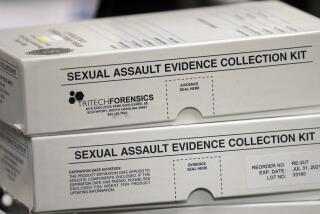Voluntary AIDS Testing Program Passed by House
- Share via
WASHINGTON — The House on Friday passed a major AIDS policy bill that would expand testing and counseling, protect the confidentiality of test results and speed research into the fatal disease.
The vote on the AIDS Federal Policy Act was 367 to 13.
The bill’s centerpiece is a $400-million-a-year grant program for voluntary testing and counseling, aimed at people with a high risk of exposure to the virus that causes acquired immune deficiency syndrome. States and health facilities would have to comply with a number of conditions to get the money.
The lopsided House vote came after nearly two years of backstage wrangling among lawmakers with dramatically different views on how to cope with AIDS.
The breakthrough compromise came last spring when liberals agreed to eliminate a controversial provision outlawing discrimination against carriers of the AIDS virus and people with AIDS-related medical problems.
Rep. Henry A. Waxman (D-Los Angeles), chief sponsor of the testing bill, called it “a hard-fought synthesis” of proposals culled from five days of hearings before his health subcommittee of the Energy and Commerce Committee.
“The bill is not perfect and it is no one’s first choice. But it is a balanced compromise,” Waxman said as debate on the bill began last week.
The Senate last April passed an AIDS education and research bill that has scant common ground with the House testing measure. A parliamentary maneuver by the House will allow the bills to be joined in a House-Senate conference committee.
A testing bill introduced by Sen. Edward M. Kennedy (D-Mass.) remained submerged in Kennedy’s Labor and Human Resources Committee, with lawmakers unable to resolve the inflammatory issues it raised. Some problems may arise when senators are asked to approve the conference report, including the House testing bill, without having debated the testing issue themselves.
Notification Defeated
Before passing its bill Friday, the House defeated an attempt by Rep. Bill McCollum (R-Fla.) to add an amendment requiring doctors to make “a reasonable effort” to notify spouses of people who test positive for the AIDS virus.
McCollum’s motion was defeated 279 to 105 after Waxman and others argued that the notification requirement would leave doctors wide open to lawsuits. They said the bill already permits doctors to notify spouses, even without the consent of the patient.
On Thursday, the House rejected a series of amendments that would have required all states to test prisoners and high-incidence states to test hospital patients and marriage license applicants. By some estimates, the latter two mandates would have affected 34 states.
The bill as passed would give states $200 million for each of the next three years for testing programs; another $200 million a year would go directly to health-care facilities serving high-risk populations.
Anonymous Testing
Testing would have to be voluntary and accompanied by counseling. Anonymous testing and the use of pseudonyms would have to be permitted to the extent possible under state laws.
All persons convicted of prostitution or crimes related to sexual assault or intravenous drug abuse would have to be tested. States would also have to collect demographic information about those who test positive and establish civil and criminal penalties for violations of confidentiality standards outlined in the bill.
Health professionals or others who violated the standards, whether or not intentionally, could be fined up to $10,000 for each offense. An intentional violation could result in up to a year in prison. A person harmed by improper disclosure could sue for at least $2,000.
The bill permits disclosure of positive test results under certain circumstances, including to sexual partners and needle-sharing contacts unlikely to be notified by the infected individual.
Would Expedite Grants
Under a research section similar to one passed by the Senate, the House bill requires that AIDS research grants be awarded on an expedited basis and that an additional 780 people be hired by the Public Health Service and Food and Drug Administration. Some new research projects are authorized. Total cost of the research section is estimated at $285 million in fiscal 1989.
The bill also authorizes $2 million for the National Commission on AIDS, which would make recommendations to Congress within two years on AIDS research, testing, treatment and prevention of the disease.
Members would include the secretary of health and human services, the administrator of veterans affairs, three people appointed by the President and 10 appointed by House and Senate leaders.
The Senate education and research bill, passed by a vote of 87 to 4 in April, overlaps slightly with the House AIDS measure. For example, it requires increased hiring of AIDS personnel at the National Institutes of Health and testing of prisoners convicted of crimes related to sex or intravenous drugs.
Other major Senate provisions authorize money for state and federal AIDS education programs, a new home health-care program for AIDS victims and special efforts to help high-risk minorities and drug abusers.
More to Read
Sign up for Essential California
The most important California stories and recommendations in your inbox every morning.
You may occasionally receive promotional content from the Los Angeles Times.









